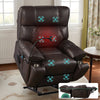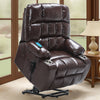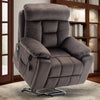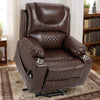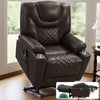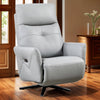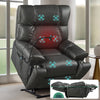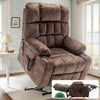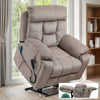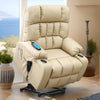Understanding the Health Needs of Senior Women
The Importance of Regular Health Check-Ups
Regular health check-ups are vital for senior women. They help detect health issues early, when they're easier to treat. These check-ups include screenings for common age-related conditions.

Doctors can monitor changes in blood pressure, cholesterol, and bone density. They can also check for signs of heart disease, diabetes, and cancer. Regular eye and hearing tests are important too.
These visits allow women to discuss any health concerns with their doctor. They can get advice on diet, exercise, and lifestyle changes. This proactive approach can lead to better overall health and quality of life.
Key Health Issues Affecting Senior Women
Senior women face unique health challenges. Osteoporosis is a major concern, as women lose bone density after menopause. This increases the risk of fractures.
Heart disease is another significant issue. It's often overlooked in women, but it's a leading cause of death. Symptoms can be different from those in men, so awareness is crucial.
Alzheimer's disease affects more women than men. Breast and ovarian cancers are also concerns. Urinary incontinence and pelvic floor disorders are common but often not discussed.
Mental health is equally important. Depression and anxiety can affect quality of life. Addressing these issues is vital for overall well-being.
Strategies for Maintaining Health and Well-being
Maintaining health in later years involves several key strategies:
- Regular exercise: This helps maintain strength, balance, and flexibility.
- Healthy diet: A balanced diet rich in fruits, vegetables, and lean proteins is essential.
- Adequate sleep: Good sleep habits support overall health and cognitive function.
- Social engagement: Staying connected with friends and family helps mental health.
- Mental stimulation: Activities like reading, puzzles, and learning new skills keep the mind sharp.
- Stress management: Techniques like meditation or yoga can reduce stress.
- Regular medical check-ups: These help catch and address health issues early.
Staying active and engaged in life is crucial. It's never too late to adopt healthy habits and improve well-being.
Innovative Products for Senior Women's Comfort and Mobility
Lift Chairs and Recliners: Elevating Daily Life
Lift chairs and recliners are game-changers for senior women. They offer comfort and independence in daily life. These chairs help with sitting down and standing up, reducing strain on joints and muscles.

Lift chairs come with various features. Some have heat and massage functions for extra comfort. Others offer multiple positions for reading, watching TV, or napping.
These chairs can significantly improve quality of life. They make it easier to relax and reduce the risk of falls. For women with arthritis or mobility issues, lift chairs provide much-needed support.
Choosing the right lift chair is important. Consider factors like size, weight capacity, and available features. A well-chosen lift chair can become an essential part of a comfortable home setup.
Mobility Aids: Enhancing Movement and Independence
Mobility aids are crucial for maintaining independence. They come in various forms to suit different needs. Walkers, canes, and rollators are common options.
Walkers provide stability for those with balance issues. They come in folding designs for easy transport. Some have seats for resting during walks.
Canes are versatile and portable. They're great for mild balance problems or when recovering from an injury. Quad canes offer extra stability with four points of contact.
Rollators, or wheeled walkers, are ideal for longer distances. They often include a seat and basket for convenience. These aids allow seniors to stay active and engaged in their communities.
Choosing the right mobility aid is crucial. It should fit the user's height and strength level. Proper use can greatly enhance safety and independence in daily activities.
The Role of Technology in Health Monitoring and Management
Technology plays a growing role in senior health care. Wearable devices can track vital signs and activity levels. They can alert users or caregivers to potential health issues.
Smartphone apps help manage medications and appointments. Some apps provide reminders for taking pills or scheduling check-ups. Others offer exercises or meditation guides tailored for seniors.
Telemedicine is becoming more common. It allows seniors to consult with doctors from home. This is especially helpful for those with mobility issues or living in rural areas.
Smart home devices can enhance safety. Fall detection systems can automatically call for help if needed. Voice-activated assistants can control lights and appliances, reducing fall risks.
These technologies empower senior women to take charge of their health. They provide valuable data and support for both seniors and their caregivers.
Resources and Support Systems for Elderly Care
Navigating the Healthcare System in the United States
Navigating the U.S. healthcare system can be complex for seniors. Medicare is the primary health insurance for most Americans over 65. It covers many medical services, but not all.

Understanding Medicare options is crucial. Original Medicare includes Part A (hospital insurance) and Part B (medical insurance). Medicare Advantage plans (Part C) offer an alternative with additional benefits.
Supplemental insurance, or Medigap, can help cover costs that Medicare doesn't. It's important to compare plans and understand what each covers.
Senior women should be aware of preventive services covered by Medicare. These include mammograms, bone density scans, and flu shots. Taking advantage of these can help maintain good health.
Patient advocacy groups can provide guidance on healthcare decisions. They offer resources to help seniors understand their rights and options.
Home Care Services and Resources
Home care services allow many seniors to age in place comfortably. These services range from basic assistance to skilled nursing care.
Personal care assistants can help with daily tasks like bathing and dressing. They may also assist with light housekeeping and meal preparation.
Home health aides provide more advanced care. They can help manage medications and monitor health conditions. Some are trained to use medical equipment.
Meal delivery services are available in many areas. They provide nutritious meals for seniors who have difficulty cooking.
Transportation services can help seniors get to medical appointments or run errands. This is crucial for maintaining independence when driving is no longer an option.
Many communities offer home modification programs. These can help make homes safer and more accessible for seniors with mobility issues.
Community Support and Networking for Senior Women
Community support is vital for senior women's well-being. Senior centers offer a place to socialize and participate in activities. Many provide exercise classes, crafts, and educational programs.
Support groups can be invaluable. They connect women facing similar challenges. Groups may focus on specific health issues or general aging concerns.
Volunteer opportunities allow seniors to stay engaged and give back. Many organizations value the experience and skills that older adults bring.
Local libraries often have programs tailored for seniors. These may include book clubs, technology classes, or lecture series.
Churches and religious organizations can provide spiritual support and community connections. Many offer services specifically for seniors.
Online forums and social media groups can connect senior women with peers. These platforms allow for sharing experiences and advice from the comfort of home.
Building a strong support network is crucial. It helps combat isolation and promotes overall well-being for senior women.








